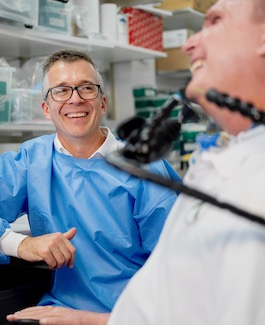Working towards eradicating malaria with a new vaccine
Malaria is a life-threatening disease caused by parasites that are transmitted to people through the bites of infected mosquitoes. It remains one of the deadliest diseases, the World Health Organisation estimates 619,000 people have died from malaria deaths in 2021, most of them children under 5 years of age, with 80 per cent of cases in African countries.
The urgency of this need, set against a complex geopolitical landscape is the stage on which Griffith’s Malaria Vaccine Project operates. Bringing together scientists from the Institute for Biomedicine and Glycomics and after years of research the team is now one step closer with human trials.
A highly effective malaria vaccine is urgently needed to reduce malaria disease and death
Assoc Prof Danielle Stanisic
The research team took a novel approach when developing the PlasProtecT vaccine, allowing it to target the malaria parasite that lives in the red blood cells, differentiating it from GSK’s Mosquirix vaccine that provides only partial protection from the worst effects of the disease.
Vaccination is the pathway to eradication of the disease and there is room for multiple vaccines to shift the fight against malaria. But one of the key concerns is the transportation and storage for any vaccine rollout in developing countries.
Lead researcher Dr Danielle Stanisic said this is a key advantage of the PlasProtecT vaccine, it can be frozen or freeze-dried into a powder without losing its effectiveness.
“We still have to do studies to find out just how long you can store it and at different temperatures,” she said.
“But the fact you can pull the moisture out of it, leaving a powder, and then just transport that powder and reconstitute it just prior to injecting somebody would make it a lot easier to take into the field.”
One of the major partners in this long running project is Rotary District 9640. They have been involved in fundraising before the Malaria Vaccine Project was officially launched in 2017. It was rotary members that first helped Dr Stanisic purchase critical laboratory equipment to produce the malaria vaccine.
Co-research lead Professor Michael Good AO said the human clinical trials were also only possible through the generous support of Rotary District 9640, who have helped raise $1.34M over the past five years.
“A highly effective malaria vaccine is urgently needed to reduce malaria disease and death, as we move towards the ultimate goal of eradication,” he said.
“But further funding is still needed to test the vaccine for its effectiveness in preventing malaria infection.”
Malaria vaccines are needed now more than ever, as parasites become increasingly resistant to commonly used antibacterial treatments.
More than $100 million of philanthropy has already been secured to create a brighter future for all.
Read more impact stories

Using nasal stem cells to find new ways to treat spinal cord injury
Professor James St John’s team are developing new therapies to give people back their independence.

The transformative power of music
Thanks to the Distinguished Visiting Artist-Teacher Residency Program, students are learning alongside the best in the industry, bringing renowned musicians, directors and performing artists to work with our students at Griffith.

Changing the lives of mothers in prison and their children
Prof Susan Dennison's team are piloting programs to change the lives of incarcerated mothers, approaches that are designed to reduce reoffending and put an end to intergenerational cycles of adversity.